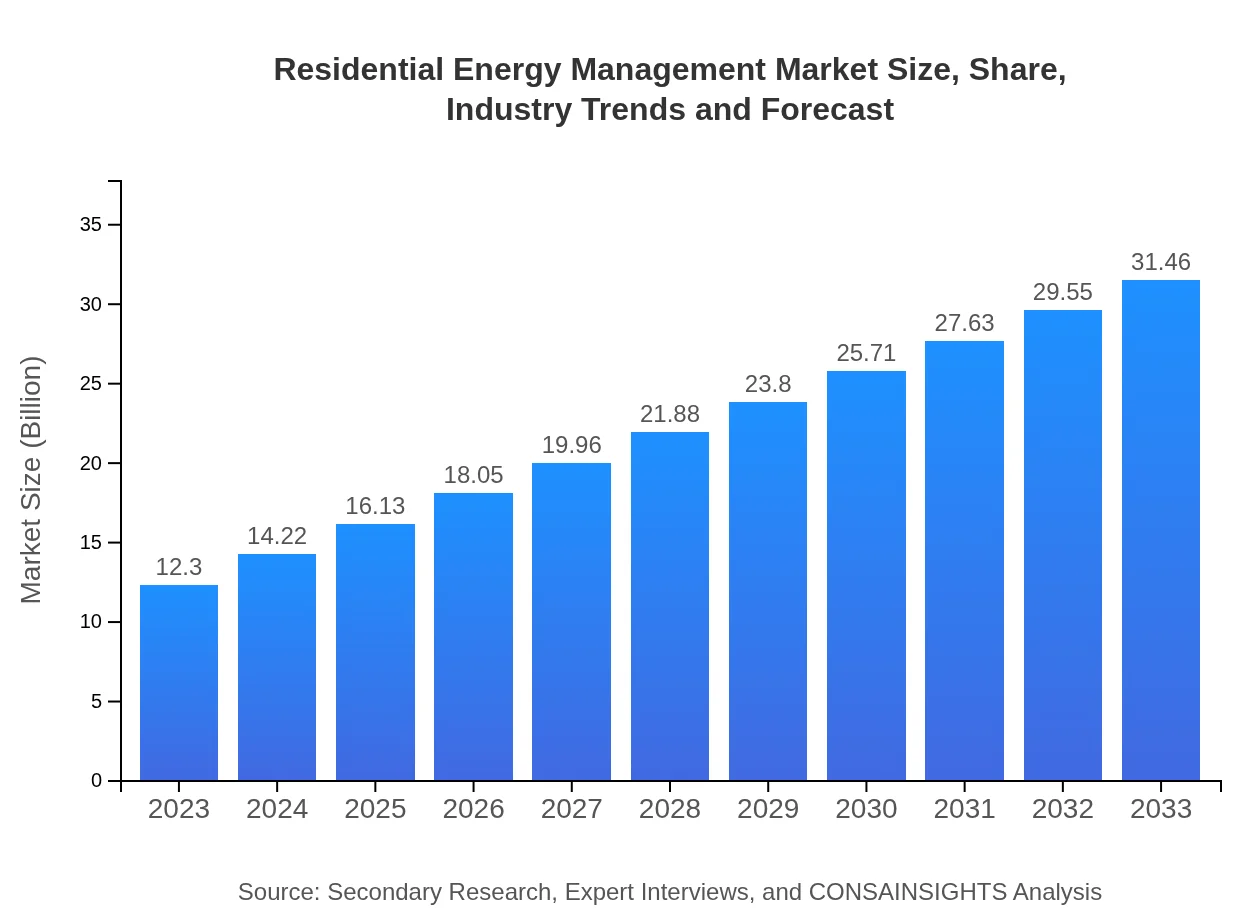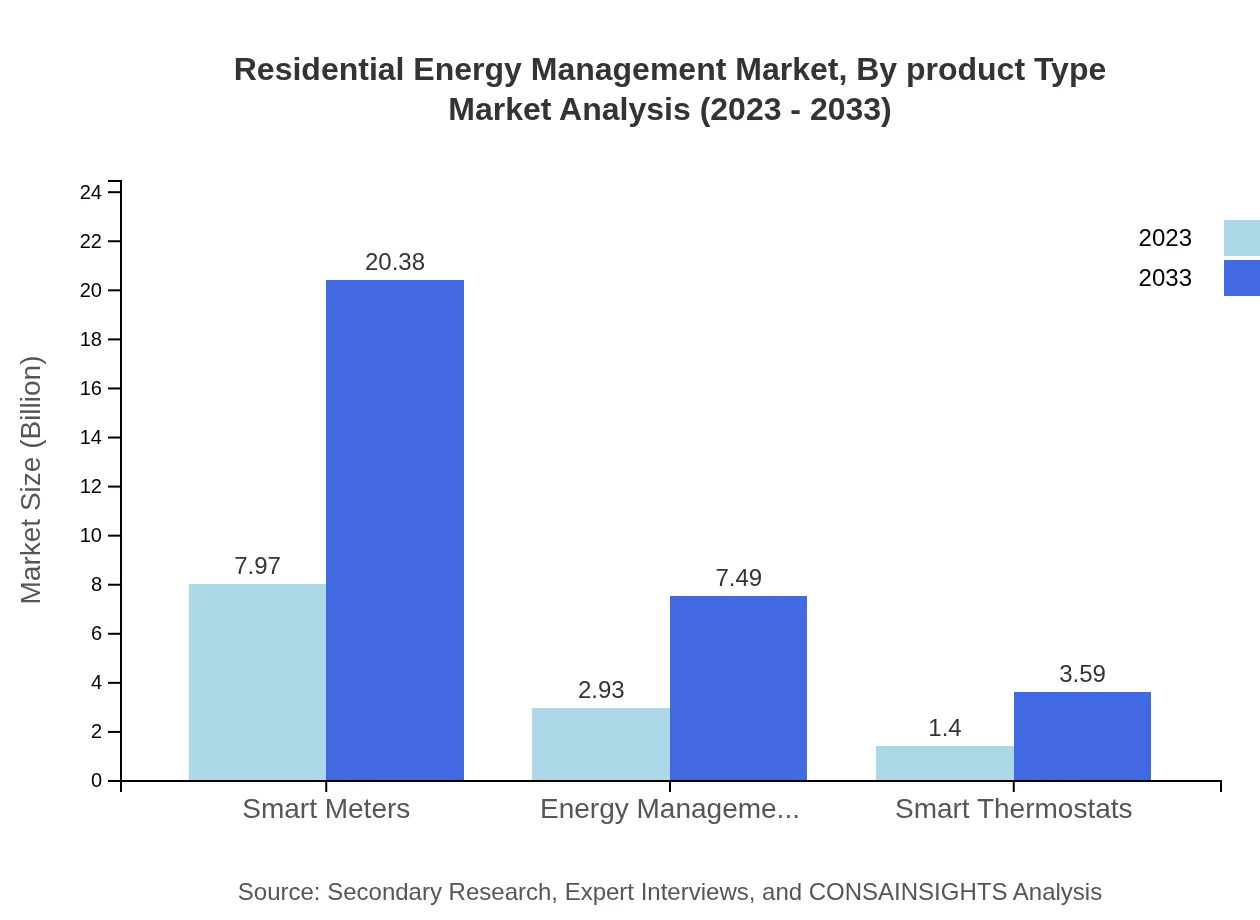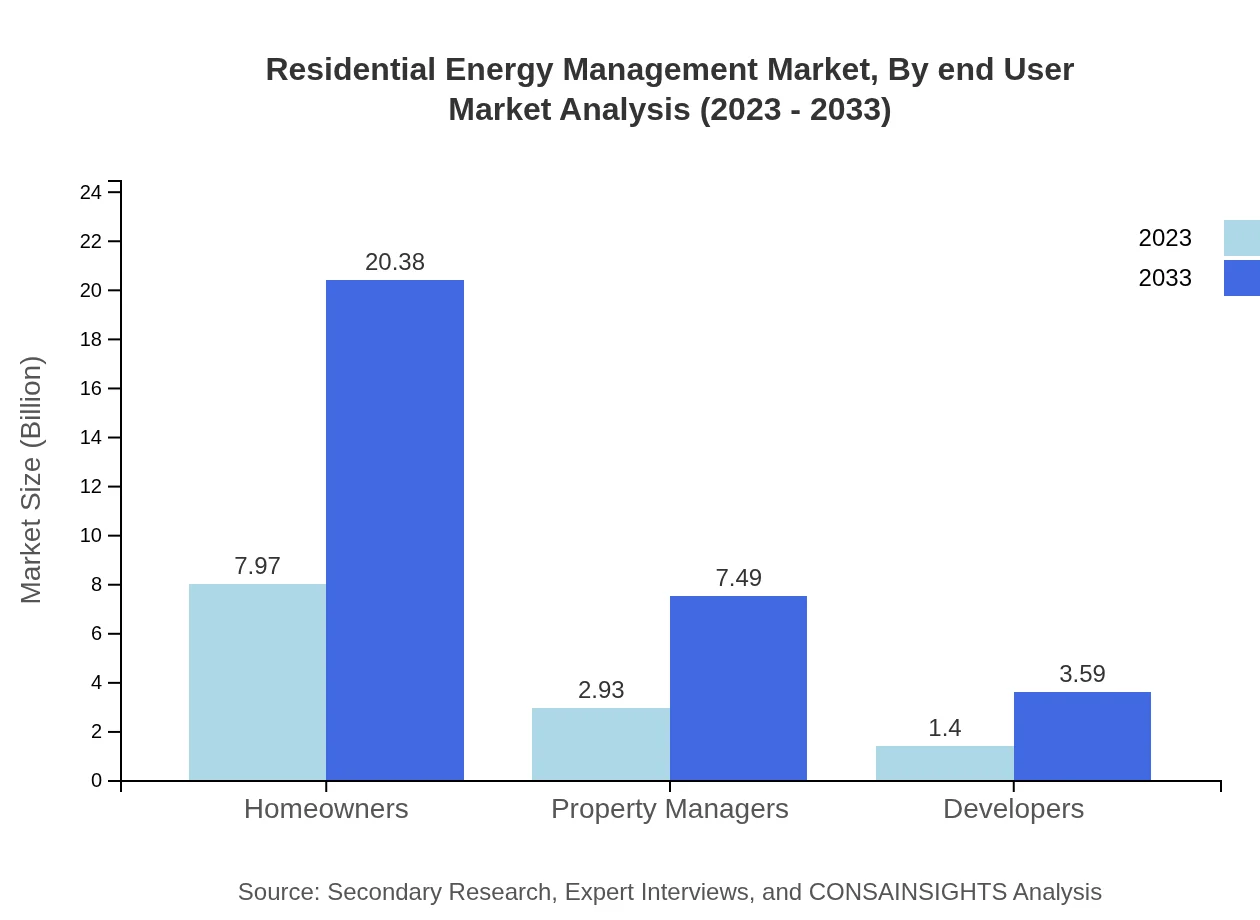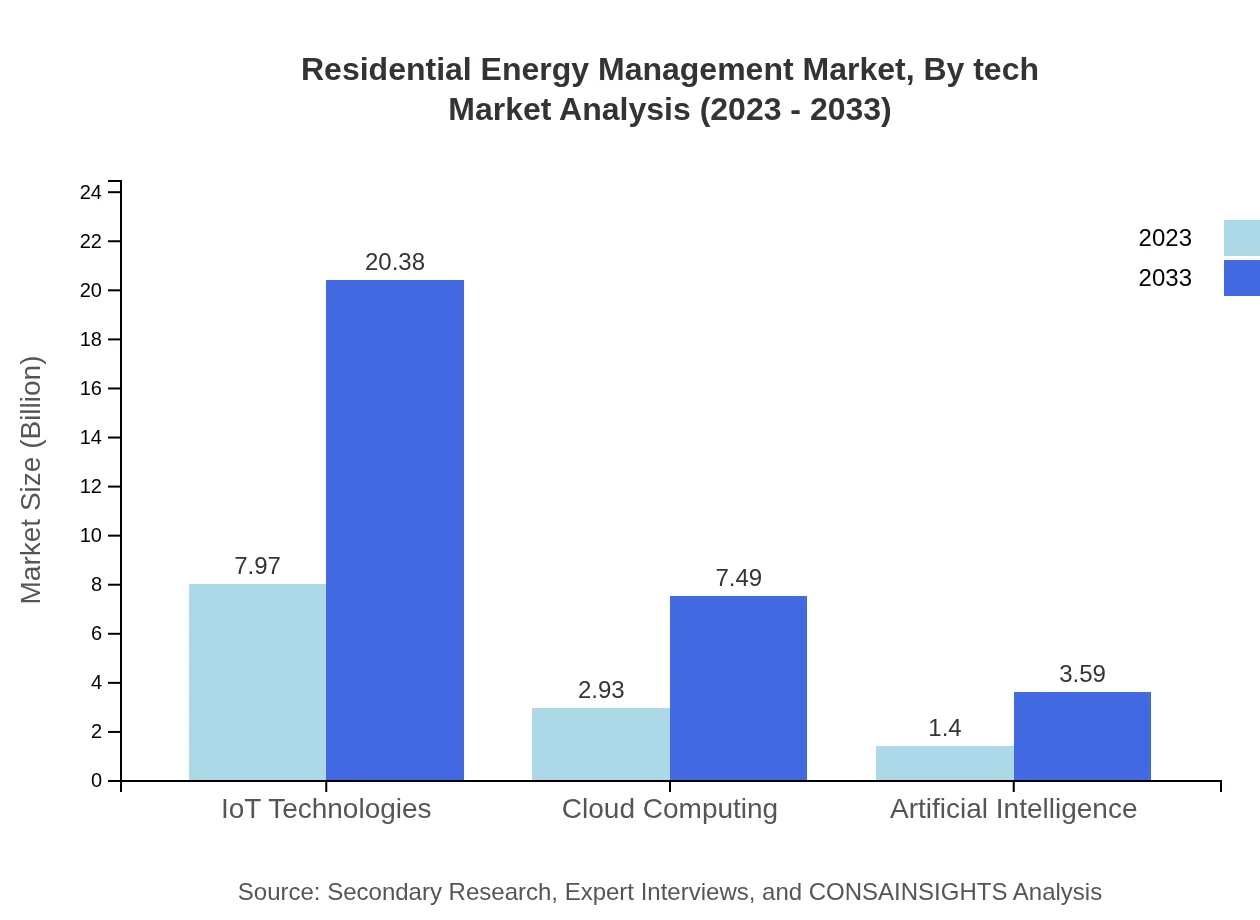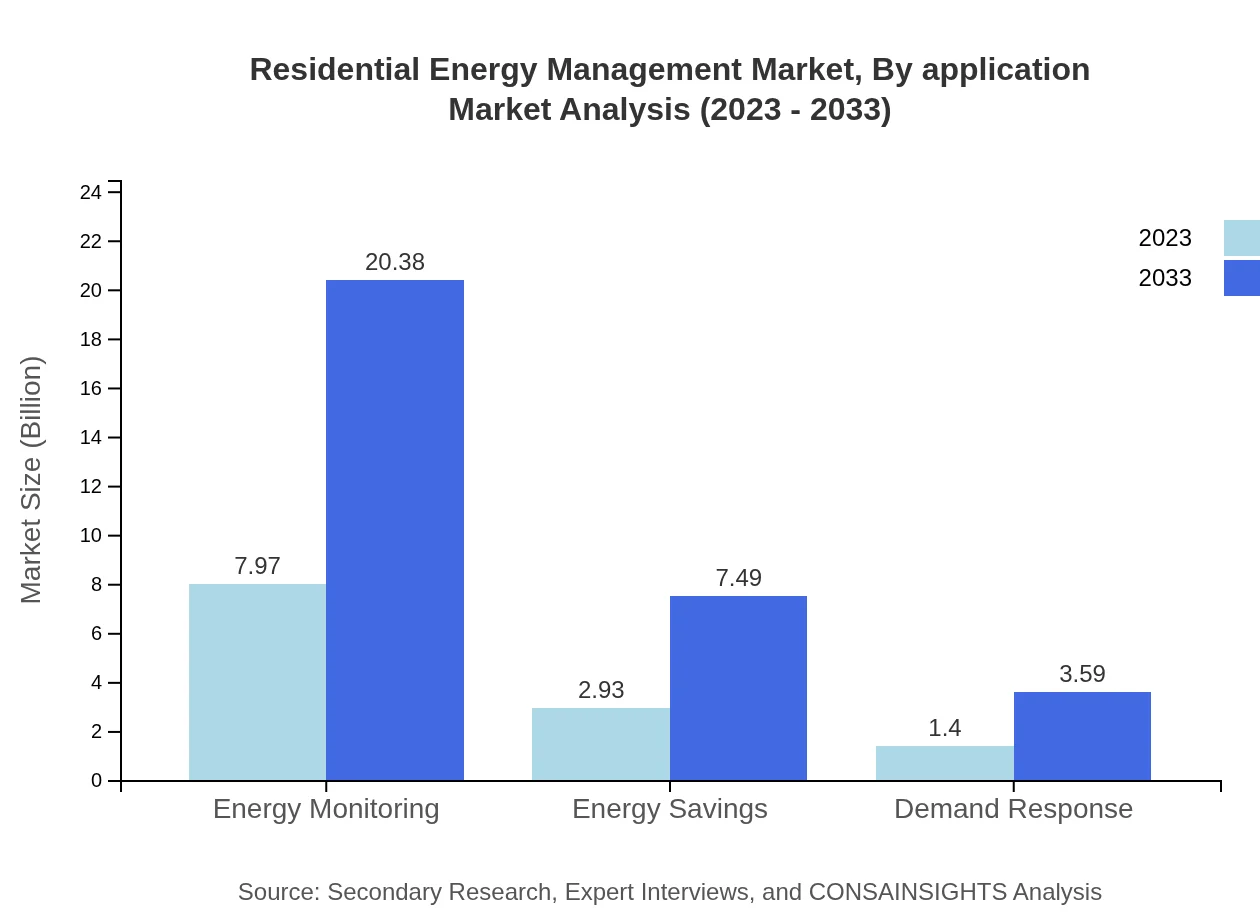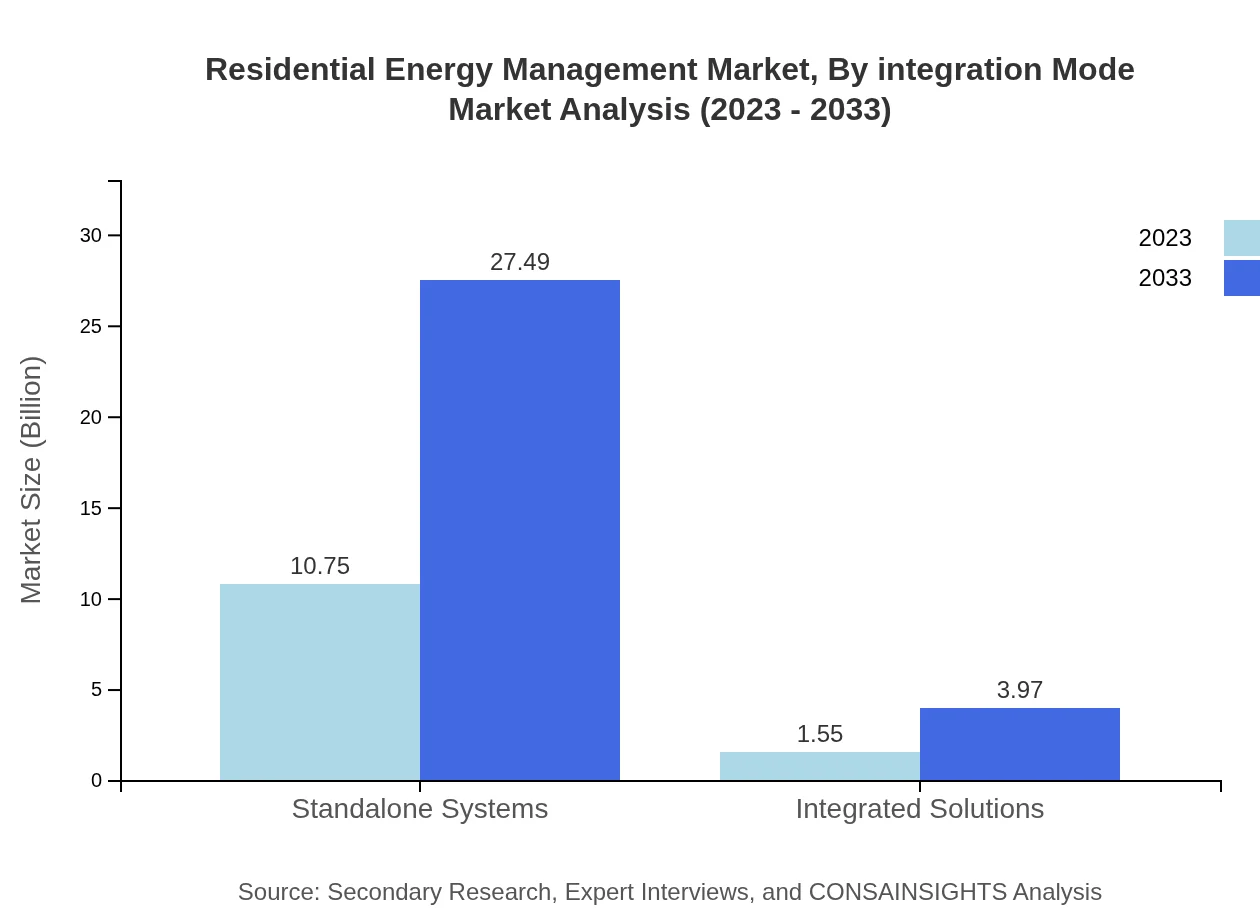Residential Energy Management Market Report
Published Date: 31 January 2026 | Report Code: residential-energy-management
Residential Energy Management Market Size, Share, Industry Trends and Forecast to 2033
This report presents a comprehensive analysis of the Residential Energy Management market, covering market size, trends, regional insights, and future forecasts from 2023 to 2033.
| Metric | Value |
|---|---|
| Study Period | 2023 - 2033 |
| 2023 Market Size | $12.30 Billion |
| CAGR (2023-2033) | 9.5% |
| 2033 Market Size | $31.46 Billion |
| Top Companies | Honeywell , Nest Labs (Google), Schneider Electric, Siemens |
| Last Modified Date | 31 January 2026 |
Residential Energy Management Market Overview
Customize Residential Energy Management Market Report market research report
- ✔ Get in-depth analysis of Residential Energy Management market size, growth, and forecasts.
- ✔ Understand Residential Energy Management's regional dynamics and industry-specific trends.
- ✔ Identify potential applications, end-user demand, and growth segments in Residential Energy Management
What is the Market Size & CAGR of Residential Energy Management market in 2023?
Residential Energy Management Industry Analysis
Residential Energy Management Market Segmentation and Scope
Tell us your focus area and get a customized research report.
Residential Energy Management Market Analysis Report by Region
Europe Residential Energy Management Market Report:
Europe's Residential Energy Management market was valued at around $2.97 billion in 2023, forecasted to reach $7.60 billion by 2033. Factors contributing to growth include stringent regulations on energy efficiency, widespread adoption of smart meters, and government incentives aimed at reducing carbon emissions in residential settings.Asia Pacific Residential Energy Management Market Report:
In the Asia Pacific region, the Residential Energy Management market was valued at approximately $2.55 billion in 2023 and is projected to reach $6.52 billion by 2033. Growth in this region is driven by rapid urbanization, increasing energy demand, and rising awareness about energy conservation among consumers. Countries like China, Japan, and India are leading the charge in adopting advanced energy management technologies.North America Residential Energy Management Market Report:
North America stands as a significant player in the Residential Energy Management market, with a value of approximately $4.46 billion in 2023. Projections indicate that it will grow to $11.40 billion by 2033. The United States leads in market adoption, propelled by consumer demand for smart home technologies and robust infrastructure for renewable energy integration.South America Residential Energy Management Market Report:
The South American market for Residential Energy Management recorded a value of around $0.92 billion in 2023, with expectations to reach $2.37 billion by 2033. The region is witnessing growing investments in smart technologies, driven by both governmental initiatives and the necessity for more efficient energy usage, particularly in countries like Brazil and Argentina.Middle East & Africa Residential Energy Management Market Report:
In the Middle East and Africa, the Residential Energy Management market was valued at about $1.40 billion in 2023 and is expected to rise to $3.57 billion by 2033. The growth in this region is attributed to increasing investments in infrastructure and energy management technologies, alongside a growing emphasis on sustainability and energy efficiency.Tell us your focus area and get a customized research report.
Residential Energy Management Market Analysis By Product Type
The product type segmentation of REM includes IoT technologies, cloud systems, and smart appliances. In 2023, IoT technologies alone comprise a significant market size of $7.97 billion, with an expected rise to $20.38 billion by 2033, contributing to about 64.77% market share. Other product types such as smart meters ($7.97 billion in 2023) and energy management systems further drive the market with demand for integrated solutions.
Residential Energy Management Market Analysis By End User
End-user segmentation highlights homeowners, property managers, and developers. Homeowners represent the largest segment with a size of $7.97 billion in 2023, maintaining a steady market share of 64.77%. Property managers and developers also show increasing demand, expected to reach $3.59 billion and $1.40 billion respectively by 2033 as sustainable living spaces become a priority.
Residential Energy Management Market Analysis By Tech
Technologies integral to REM include IoT, AI, and cloud computing. The market for AI is projected to expand from $1.40 billion in 2023 to $3.59 billion by 2033, while cloud computing will rise from $2.93 billion to $7.49 billion. These technologies are vital for enhancing energy usage forecasts and improving system interconnectivity.
Residential Energy Management Market Analysis By Application
Key applications for REM include energy monitoring, savings, demand response, and smart thermostats. Energy monitoring, valued at $7.97 billion in 2023, illustrates consumer demand for real-time data on energy usage. Similarly, energy savings applications are valued at $2.93 billion and are focused on enhancing overall residential energy efficiency.
Residential Energy Management Market Analysis By Integration Mode
The integration modes include standalone systems and integrated solutions. Standalone systems dominate the market with $10.75 billion in size in 2023, as homeowners favor easy-to-install modules. Integrated solutions worth $1.55 billion, projected to grow to $3.97 billion, are gaining traction due to their comprehensive, interconnected features.
Residential Energy Management Market Trends and Future Forecast
Tell us your focus area and get a customized research report.
Global Market Leaders and Top Companies in Residential Energy Management Industry
Honeywell :
A global leader in energy management providing a range of smart home products and solutions for energy efficiency and sustainability.Nest Labs (Google):
Innovators in smart thermostat technologies, Nest Labs focuses on consumer-centric solutions that enhance energy efficiency in residential properties.Schneider Electric:
Known for its comprehensive energy management systems, Schneider Electric leads in sustainable energy solutions that significantly reduce home energy usage.Siemens :
A major player in integrating advanced technology into energy management, Siemens develops smart solutions for improved residential energy efficiency.We're grateful to work with incredible clients.









FAQs
What is the market size of residential Energy Management?
The global residential energy management market size is estimated at $12.3 billion in 2023, with a projected CAGR of 9.5% from 2023 to 2033, indicating significant growth potential within the industry.
What are the key market players or companies in this industry?
Key players in the residential energy management industry include companies that specialize in energy monitoring solutions, smart thermostats, IoT technologies, and cloud computing services catering to both homeowners and property managers.
What are the primary factors driving the growth in this industry?
Factors driving growth include increasing demand for energy efficiency, advancements in IoT and AI technologies, regulatory initiatives promoting sustainable practices, and rising consumer awareness regarding energy consumption and management.
Which region is the fastest Growing in this market?
North America represents the fastest-growing region in the residential energy management market. The market in North America is projected to grow from $4.46 billion in 2023 to $11.40 billion by 2033.
Does ConsaInsights provide customized market report data for the industry?
Yes, ConsaInsights offers customized market research reports tailored to specific segments within the residential energy management industry, ensuring clients receive data that meets their unique strategic needs.
What deliverables can I expect from this market research project?
Deliverables from the residential energy management market research project typically include comprehensive market analysis reports, segment-wise breakdowns, competitive assessments, future forecasts, and actionable insights tailored to client objectives.
What are the market trends of this industry?
Major trends in the residential energy management market include a growing shift toward IoT and AI-driven solutions, increased adoption of smart meters, and a focus on integrated solutions that enhance energy efficiency and consumer engagement.

